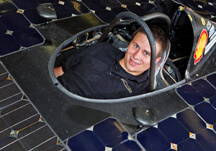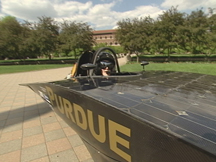

May 6, 2009
Purdue student team wins solar-car division at 'Eco-Marathon'
WEST LAFAYETTE, Ind. - |
Purdue Solar Racing, an extracurricular club of students in disciplines ranging from engineering to business administration, received a $2,500 prize. It was the second consecutive year Purdue's team won the solar category in the Shell Eco-Marathon Americas, held last month in California.
"Over the past two years we've put together an excellent car and a great team," said MacKenzie Sellers, a senior in materials engineering and president of Purdue Solar Racing. "The team functions as a project team would in industry. We have a budget and schedule to design and build the vehicle. We perform testing, and we work with different disciplines to accomplish our goals."
She will graduate this May and start work for Rolls-Royce Corp. in Indianapolis. Sellers, 22, said her experience working on the project was instrumental in finding a job.
"It really gave me that leadership experience and a hands-on engineering experience," she said. "Many students don't really get that sort of opportunity. It's ideal preparation for careers in engineering."
The Purdue car, called Pulsar, cost about $75,000 to build last year and another $11,000 this year to modify. Major project sponsors are Lockheed Martin Corp. and Exelon Corp. and Purdue's schools of aeronautics and astronautics, mechanical engineering, electrical and computer engineering, materials engineering and environmental and ecological engineering.
"The most important aspect of this project is its multidisciplinary nature - it's real engineering in that sense," said Galen King, a Purdue professor of mechanical engineering and an adviser to the group. "It has included students all the way from electrical engineering to liberal arts. In other words, people from outside the geek arena."
Project teams ranged from groups focusing on the carbon-fiber body to the braking and suspension systems, as well as critical business, marketing and fundraising functions.
More than 50 students, mostly undergraduates, participate in the project. The students average 20-40 hours a week on the project.
"It provides better experience than you can get in the classroom, in the sense that you can see the project go from conception to an actual finished product," said Ted Pesyna, a junior in mechanical engineering and next year's Purdue Solar Racing president.
Most of the car's body is covered with panels containing photovoltaic cells, which convert sunlight to electricity to power a motor. The three-wheel vehicle weighs 170 pounds and has a top speed of about 25 mph. Cars in the contest drove 10.5 miles on a racetrack in Fontana, Calif.
"You do seven laps on the track," Sellers said. "You are not really racing against anyone. You are traveling a certain distance to measure what your efficiency is."
A mathematical calculation is used to convert the car's electricity consumption to miles per gallon of gasoline. Last year's Pulsar achieved 2,861.8 miles per gallon at the competition.
The students plan to enter the 2010 Eco-Marathon, but in a more challenging "urban concept" category. Next year's car, called Celeritas - Latin for swiftness - will be designed and built from scratch, Sellers said.
"The team tries to build a new car every two years because the rules of races change in order to keep things more innovative," she said.
The project contains an outreach component, as well.
"Because grade school and secondary school children are very excited about solar technology, we go to schools and show the car," Sellers said. "Sometimes grade schools have their own solar car projects, and we'll provide some guidance."
Writer: Emil Venere, (765) 494-4709, venere@purdue.edu
Sources: MacKenzie Sellers, mnseller@purdue.edu
Galen King, 765-494-6518, kinggb@purdue.edu
Ted Pesyna, tpesyna@purdue.edu
Purdue News Service: (765) 494-2096; purduenews@purdue.edu
PHOTO CAPTION:
Ted Pesyna, a junior in mechanical engineering at Purdue, sits in Pulsar, a solar car designed and built by Purdue Solar Racing, an extracurricular club of students from disciplines ranging from engineering to business administration. The student team won the solar-car category of this year's Shell Eco-Marathon Americas, achieving the equivalent of 4,913 miles per gallon, the most ever recorded at the event. (Purdue University photo/Andrew Hancock)
A publication-quality photo is available at https://www.purdue.edu/uns/images/+2009/king-solarcar.jpg
To the News Service home page
If you have trouble accessing this page because of a disability, please contact Purdue News Service at purduenews@purdue.edu.

 *
*